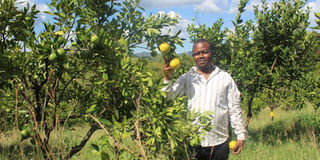Why grafted oranges are the way to go

Kiprop Kiprotich's Chelan Farm in Keiyo South where oranges and mangoes are grown. His oranges take two to three years to mature and are hardy and high-yielding because he grafts them with lemons. PHOTO | STANLEY KIMUGE | NATION MEDIA GROUP
What you need to know:
- Kiprop Kiprotich’s Chelan Farm boasts of 400 orange trees of different varieties that include Valencia, and Washington navel.
- He uses grass to mulch the trees to prevent water from evaporating since the region receives unreliable rainfall.
- Farmers should also not inter-crop orange and mango trees to avoid competition. Intercrop the oranges with short-term crops such as legumes in the first one or two years.
- According to Kiprop, oranges are on high demand compared to mangoes and the advantage is that they have a longer shelf-life.
The weather is misty when we arrive in Iten town, a popular sports training ground for both local and foreign athletes.
Our destination is Koimur village on Kiprop Kiprotich’s Chelan Farm in Keiyo South in the Kerio Valley. And as we drive on towards Koimur, the mist clears, ushering in a hot and humid air.
We find Kiprotich, 32, on his farm tending to his oranges. The former Bachelor of Science, Electrical and Control Engineering student at Egerton University has taken to farming fruits after he terminated his studies in 2011 following controversy on the eligibility of the institution to offer the course.
He has now taken up to farming, which according to him has been part and parcel of his life since his parent’s farm.
“I jointly farm with my father. We agreed he grows mangoes as I grow oranges. We have 30 acres in total, oranges occupying three acres while mangoes 13,” he says.
His farm boasts of 400 orange trees of different varieties that include Valencia, and Washington navel.
The latter is a seedless variety, bigger and tastier compared to Valencia, which does well in warm and dry climate. Generally, mangoes are tolerant to harsh climate compared to oranges.
As we tour the farm, Kiprotich stops for a moment and stares at a squelched fruit hanging on one of the trees.
“It might have burst due to lack of water or calcium. Sometimes this happens when the trees lack water due to excessive evaporation, especially during the flowering stages,” says the farmer.
He uses grass to mulch the trees to prevent water from evaporating since the region receives unreliable rainfall.
Usually, the trees are under threat especially during the dry season when the farmer has to irrigate using water from a community borehole.
“I have to use the water sparingly as I have to mind the welfare of our neighbours. Mulching helps me save on water and keeps weeds at bay.”
HAVE LONGER SHELF LIFE
His oranges take two to three years to mature and are hardy because he grafts them with lemons. Normally, ungrafted fruits take up to five years. He first plants the seedlings in a nursery and later he grafts them with lemon stocks.
Manure is used during planting and the crops are watered thoroughly.
“Aphids, leaf minor and white flies are notorious from the early stages that one needs to spray.”
On average, each tree offers Kiprotich between 120-150 fruits a season that spreads from April to November. Ungrafted oranges offer about half the yields and mature less faster.

A trader packaging lemon fruits ready for clients in Kakamega. Lemon fruits are on high demand as food, medicine and for beauty. Oranges grafted with lemon trees mature faster and yield higher. PHOTO | BY ISAAC WALE | NATION MEDIA GROUP
He sells the oranges to traders in Kapkaiyo and Kimwarer markets, who later ferry them up to Nairobi.
One piece goes from Sh10 to Sh20, depending on whether they are sold on retail or wholesale.
“Oranges are on high demand compared to mangoes. And the advantage is that they have a longer shelf-life,” says Kiprop, who adds he has no plan to go back to the engineering school as his focus now is on farming.
Lilian Jeptanui, a horticulture expert from Egerton University says that an orange farmer can inter-crop the oranges with short-term crops such as legumes in the first one year to maximise earnings.
But she discourages farmers against the practice as it results in competition for nutrients and water in soils.
“Farmers should also not inter-crop orange and mango trees to avoid competition. There is need for proper mulching to retain moisture and keep off weeds especially dry areas.”






